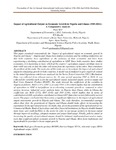| dc.description.abstract | This paper examined comparatively the “impact of agricultural output on economic growth in
Nigeria and Ghana”. Nigeria and Ghana have similar economies and the striking similarities are
that both countries have agriculture as the mainstay of their economies and have been
experiencing a declining contribution of agriculture to GDP. Since both countries have similar
economies, it is interesting to know which of the country’s agriculture output contribute more to
their GDP and why so that the other will learn from the experience of the other. That constitutes
the problem of this study. The main aim of this study was to investigate the impact of agricultural
output in stimulating growth in both countries. A model was formulated to give empirical content
to the stated hypotheses which were analyzed via the Vector Error Correction (VEC) Mechanism.
Data was collected from relevant sources for 30 year period spanning 1985 to 2014. It was
collected for variables such as for the agricultural output, industrial output, services output and
Real Gross Domestic Product (RGDP). The study showed, the coefficients of the variables in
Nigeria as follows; AGO (-1.97), IDO (2.21) and SVO (-1.81) which implies that the contribution
of agriculture to GDP is insignificant in accelerating economic growth as compared to other
sectors, however, industrial sector perform better in Nigeria than Ghana while in Ghana the
coefficients are AGO (2.52), IDO (0.42) and SVO (1.44), which implies that in terms of
contribution to GDP, agriculture contributed to Ghana GDP than other sectors followed by service
sector. The paper concluded that there exists a significant difference in the impact of agricultural
output oneconomic growth in Nigeria and Ghana. The study therefore, recommended amongst
others that; first, the government of Nigeria and Ghana should make efforts in increasing the
expenditure in the agricultural sector. Secondly, that, given the potential of the agricultural sector,
Commercial Banks, Bank of Agriculture and other financial institutions in Nigeria should channel
more loans and credit facilities to the sector in order to encourage farmers to increase output
through improved seedlings, adequate manure and proper land usage. Finally, policies aimed at
increasing the quality of agricultural outputs should be initiated, implemented and used as major
tools that would precipitate economic growth in Nigeria and Ghana. More farm implements and
inputs should be provided to boost output growth. | en_US |

